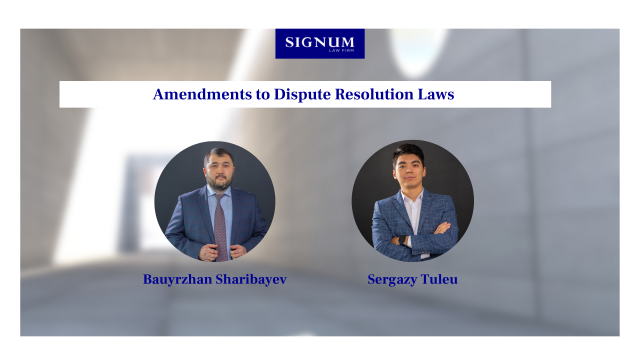Amendments to Dispute Resolution Laws
February 24, 2022
SIGNUM regularly provides Legislative/Regulatory Alerts to keep Clients informed about important laws and regulatory changes in the Republic of Kazakhstan (“RK”). This Alert includes the most significant developments adopted at the end of 2021 related to:
1. On mediation;
2. Civil Procedure Code;
3. On notaries;
4. On enforcement proceedings;
5. On marriage and family
6. On local government and self-government.
Most of the adopted changes will take effect from January 1, 2022, and some on August 1, 2022.
1. Amendments to the Mediation Law
The scope of mediation has been expanded. Now the scope of mediation also includes disputes arising from administrative relations with the participation of administrative bodies and officials.
An authorized body in the field of mediation is provided for.
The list of participants in mediation has been expanded: in addition to the parties, it now includes representatives, interpreters, experts, specialists and other persons involved in the mediation procedure. The parties to mediation are now not only legal entities and individuals, but also groups of persons, administrative bodies, and officials involved in the mediation procedure.
The concept of "non-professional mediator" has been replaced by "public mediator" who assists in reconciliation of the parties on a pro bono basis. The obligation of the akim of a city of regional importance (a district in the city, a city of district importance, a small town, a village, or a rural district) to keep a register of public mediators is envisaged.The rights and obligations of mediators have been expanded. Thus, the mediator has the right (1) to refuse mediation if he/she believes that further efforts in the process of mediation will not resolve the dispute (conflict) between the parties, or (2) to terminate mediation with the written consent of the parties. At the same time, the mediator is also obliged to regularly improve his/her professional skills.The possibility of mediation through the use of technical means of communication, as well as the certification of the dispute (conflict) settlement agreement through electronic digital signature is provided for.
Moreover, the law expanded the circle of persons who can draw up an alimony agreement. Now such persons include mediators, lawyers, members of the Chamber of Legal Advisers.
If previously the dispute (conflict) settlement agreement only needed to be signed by the parties to the dispute, now it is mandatory to have it signed by a mediator.
2. Civil Procedure Code
The regional courts and the Supreme Court have been granted the right to consider homogeneous cases according to the rules of first instance court.
Draft procedural documents can be prepared using the court’s automated information system.Starting from 01.08.2022, the right of courts to issue Court orders on transferring mandatory pension contributions to the UAPF (Unified Accumulative Pension Fund) is excluded; now such debt will be collected based on a notary's writ of execution.
A new concept of “pre-trial protocol" has been introduced. It means that now, before filing a claim, the parties must make a pre-trial protocol, which must contain a description of the evidence that the party will refer to in court. If the plaintiff does not reflect the evidence in the pre-trial protocol, he/she will not be able to further rely on it in court, or he/she will have to prove why he/she did not submit the evidence earlier. If the pre-trial protocol is made, the claim is accepted within fifteen working days from the date of its receipt.A new institution "exemplary judicial act" was introduced. An appellate or cassation court may issue an exemplary judicial act which could be used by lower courts when the subject matter or grounds are similar, and refer to the legal positions of a higher court as forth in the decision when considering homogeneous cases. Starting from 01.08.2022, the concept of contractual exterritorial jurisdiction comes into force, which implies distribution of a dispute by the automatic allocation of cases to courts with less workload, considering the profile. In other words, if, for example, the defendant is located in Almaty, the system may distribute the case not to the SIEC of Almaty, but, e.g., to the SIEC of Zhambyl region. There is also a new ground for suspension of proceedings – due to force majeure, temporarily preventing further proceedings in the case. For example, state of emergency, a threat/ emergency of natural and man-made nature.
The law now provides for the right of state bodies to file an appeal only after the permission of a higher authority. It is assumed that this would eliminate formal appeal by the defendant state bodies of legitimate decisions made in favor of entrepreneurs, and to teach state bodies to recognize mistakes and to take measures to prevent them in the future.
The appellate or cassation court, if the case is sent for consideration, must indicate indicate to the lower courts which procedural actions should be carried out when the case is reconsidered. Such instructions are now binding on the lower courts. If it is impossible to execute the instructions of a higher court, the lower court must justify the reasons for the impossibility of execution.
The law excludes correspondence proceedings due to the improvement of the institutione of simplified (written) proceedings. It is important to note that simplified (written) proceedings have been moved from Chapter 13 to the new chapter 21-1. Now the consideration of cases in simplified (written) proceedings is possible even if the case requires an interview of witnesses, appointment of a forensic examination, or other procedural actions. The review period is one month without the right of extension.
3. Amendments to other legislative acts
The possibility is provided for the dissolution of the marriage in the absence of one of the spouses. Henceforth, when dissolving a marriage at the registration office after the re-filing of the application does not require the presence of one of the spouses in the presence of his/her notarized consent to the dissolution of the marriage.
Established the period of suspension of enforcement proceedings in the case of a mediation agreement between the parties which is not more than 30 working days.
The powers of notaries to execute an inscription writ have been expanded. Now a notary has the right to recover money on the basis of an enforcement writ on the following indisputable claims:
1. on the execution of dispute settlement agreements certified by a notary in the order of pre-trial settlement;
2. on recovery of mandatory pension contributions to the UAPF (to be introduced from August 1, 2022);
3. on the execution of dispute settlement agreements concluded through a participatory procedure.
We expect that the amendments adopted in practice will contribute to the development of institutions of out-of-court settlement of most disputes, which in turn will allow the courts to focus on more complex cases where the parties could not reach a consensus.

Information contained in this Client Update is of general nature and cannot be used as legal advice or recommendation. Please note that Kazakhstan is an emerging economy, and its legislation and legal system are in constant development. Should you have any questions or want to discuss matters addressed in this Client Update, please contact us.





